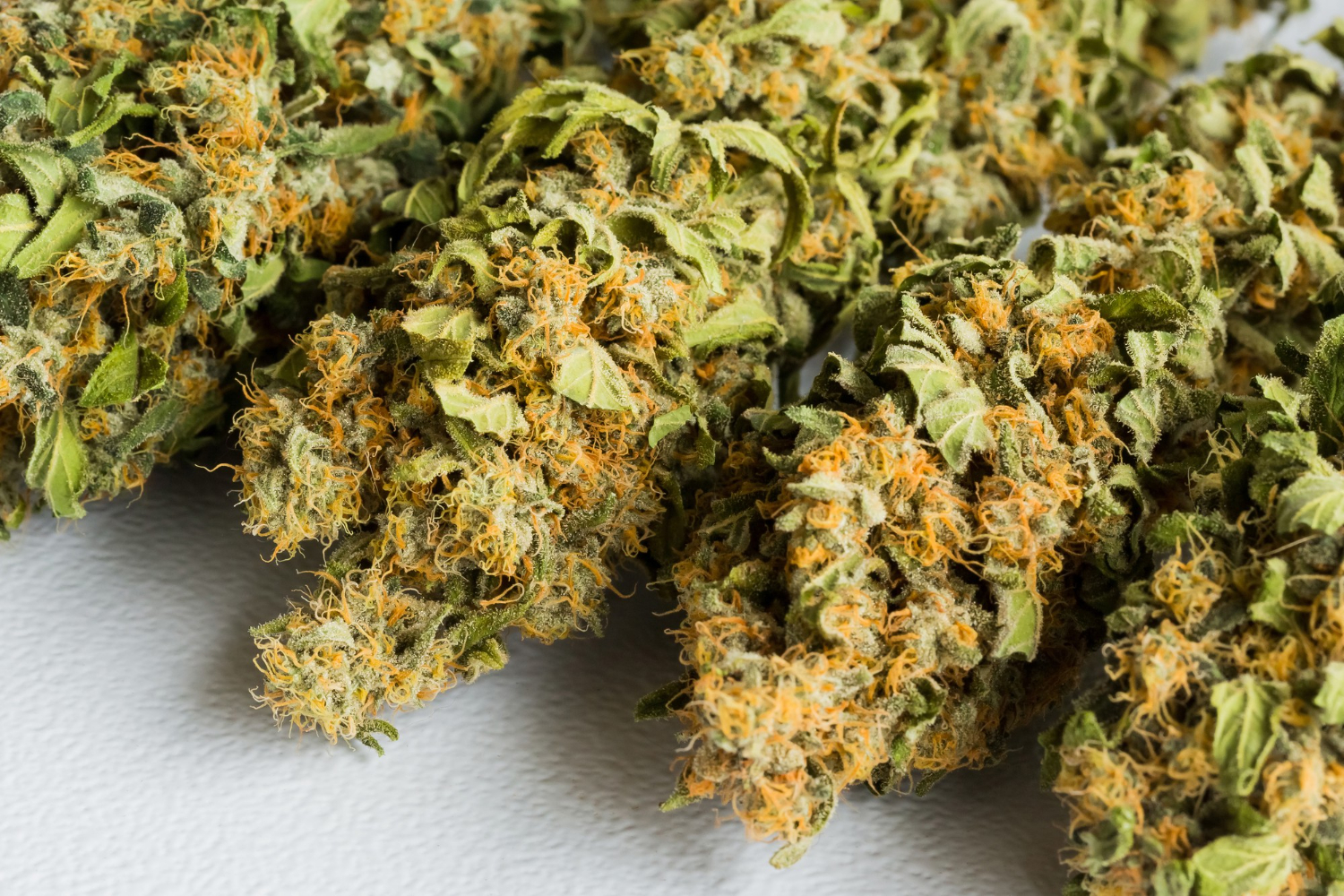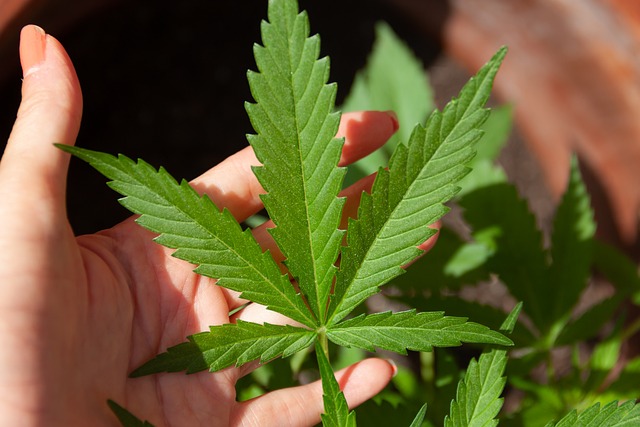Tetrahydrocannabinolic acid, or THC-A, is a cannabinoid that naturally exists in both hemp and cannabis (marijuana) and is emerging as a unique “sibling” to the more renowned THC. Its defining characteristic? Non-psychoactivity. Unlike Delta 9 THC, THC-A doesn’t induce the traditional “high” by itself, opening up a realm of possibilities for those seeking a variety of therapeutic benefits without the psychotropic journey.
Beyond the High: Unraveling THCA’s Therapeutic Potential
Delving into the world of studies, THC-A reveals promising facets. With potential anti-inflammatory and neuroprotective properties, it transcends the typical cannabis or hemp experience. It’s not just a compound for the seasoned enthusiast but an avenue for individuals prioritizing healthful attributes over recreational effects.
Understanding the chemical nuances is pivotal. THC-A’s distinctiveness lies in its chemical structure, as a precursor “acid” form. THCA is derived from CBGA, slowly breaking down from the “mother of all cannabinoids” into THCA and other cannabinoids. What sets it apart from Delta 9 THC is this chemical structure — one that renders THC-A specifically as non-psychoactive. This structure changes when put through specific chemical reactions – THC A converts into more traditional THC when it undergoes decarboxylation which usually requires intense heat. This divergence offers a refined and responsible avenue for exploration, where the emphasis shifts from the recreational to a more nuanced experience.
It should be known that many states have banned products that contain more than 0.3% ‘Total THC’. While THCA isn’t always affected by the same laws that ban Delta 9 THC, you should be staying aware of relevant local laws and regulations.

Product Prowess: THCA in Flower and Pre-Rolls
The market for THCa-infused products is expanding rapidly. Many prefer to enjoy it as pre-rolls, especially those featuring natural THC-A flower. More products are likely to appear over time, including in edibles and tinctures. This diversity caters to a broad audience, from the seasoned connoisseur to those exploring cannabinoids for the first time.
Sun State Hemp: Crafting Excellence in Hemp-Derived Products
In the burgeoning landscape of emerging compounds, trust in sourcing becomes paramount. Sun State Hemp, with its unwavering commitment to quality, stands as a beacon to consumers looking for guidance. Purity and transparency are our cornerstones, ensuring that the THCa procured from Sun State Hemp aligns with the highest standards. We use independent third-party testing for all of our products, and use only American-grown hemp as our cannabinoid sources.
Elevating Your Cannabis Experience with THC-A
THCA unfurls as a captivating chapter in cannabinoid consumption. Sun State Hemp, with its dedication to excellence, paves the way for exploring this product’s potential without the conventional high. Embrace the uniqueness of THCA, where health and wellness take center stage. Dive into this realm of cannabinoids responsibly and elevate your experience. Purchase THCA from Sun State Hemp today to embark on this captivating journey.
At Sun State Hemp, we’re making waves in the hemp cannabinoid industry every day. Based out of the sun-drenched landscapes of South Florida, we’ve been changing the game for nearly a decade.
THC-A: A Closer Look at Its Mechanisms and Applications
While THC-A is often overshadowed by its psychoactive counterpart, its unique properties and potential health benefits make it a fascinating subject of study. Here, we delve deeper into its mechanisms and applications, shedding light on why this cannabinoid deserves attention.
Mechanisms of Action: How THC-A Works
THC-A interacts with the body’s endocannabinoid system (ECS), which plays a crucial role in maintaining homeostasis. Unlike Delta-9 THC, which is responsible for the high associated with cannabis use, THC-A does not bind directly to CB1 receptors in the brain. This lack of binding is why it doesn’t produce psychoactive effects. Instead, THC-A influences other receptors and pathways, potentially modulating the immune system and reducing inflammation. This interaction suggests that THC-A might be effective in managing autoimmune diseases and chronic inflammatory conditions.
Anti-Emetic Properties
One of the lesser-known effects of tetrahydrocannabinolic acid is its anti-emetic properties. Preliminary research indicates that THC-A may help reduce nausea and vomiting, which is particularly beneficial for patients undergoing chemotherapy or those suffering from chronic illnesses that cause severe nausea. This potential makes THC-A a promising adjunct therapy for improving the quality of life for these patients.
Antioxidant and Neuroprotective Effects
The antioxidant properties of tetrahydrocannabinolic acid are also noteworthy. Antioxidants protect cells from damage caused by free radicals, which are unstable molecules that can contribute to aging and diseases like cancer. By neutralizing these free radicals, tetrahydrocannabinolic acidmay help prevent cellular damage and support overall health. Additionally, its neuroprotective effects suggest that tetrahydrocannabinolic acid could play a role in safeguarding brain health, potentially offering benefits in the context of neurodegenerative diseases.
Potential in Seizure Management
Another promising area of research is THC-A’s potential in managing seizures. While CBD is more commonly associated with anti-seizure properties, there is emerging evidence that THC-A may also have anticonvulsant effects. This could provide an additional option for patients with epilepsy who do not respond well to conventional treatments.
Skin Health and Topical Applications
THC-A is also being explored for its benefits when applied topically. Due to its anti-inflammatory and antioxidant properties, it may be effective in treating skin conditions such as acne, eczema, and psoriasis. By reducing inflammation and oxidative stress, tetrahydrocannabinolic acid could help improve skin health and alleviate symptoms associated with these conditions.
Synergistic Effects with Other Cannabinoids
The entourage effect is a phenomenon where different cannabinoids and terpenes work together to enhance each other’s effects. THC-A, when used in conjunction with other cannabinoids like CBD and CBG, may produce synergistic effects that amplify its therapeutic potential. This means that full-spectrum cannabis products containing tetrahydrocannabinolic acid could be more effective than isolated compounds, providing a more holistic approach to treatment.
Understanding the Carboxylic Acid Form
THC-A exists in the cannabis plant as a carboxylic acid. It is the precursor to Delta-9 THC, but remains non-psychoactive in this form. When raw cannabis is smoked or vaped, the heat triggers a process called decarboxylation, converting THC-A into Delta-9 THC. This chemical reaction is what produces the euphoric high associated with cannabis. For those who prefer to avoid psychoactive effects, consuming raw cannabis or products specifically formulated with THC-A allows them to benefit from its therapeutic properties without the associated high.
Future Research Directions
The current body of research on THC-A is still in its infancy, and much more needs to be done to fully understand its potential. Future studies will likely explore its effects in greater detail, investigating optimal dosages, delivery methods, and long-term impacts. Additionally, as legalization progresses and research barriers decrease, more clinical trials will provide robust data to support the therapeutic claims of THC-A.
Incorporating THC-A into Wellness Routines
For those interested in incorporating THC-A into their wellness routines, there are several options to consider. Raw cannabis juicing is one way to consume THC-A in its natural form, as the plant’s raw state contains high levels of this cannabinoid. Additionally, tinctures, capsules, and edibles made from unheated cannabis can provide a convenient way to integrate THC-A into daily health practices.
Legal Considerations and the Farm Bill
Understanding the legal landscape is crucial for THC-A consumers. The 2018 Farm Bill legalized hemp and its derivatives, provided they contain less than 0.3% Delta-9 THC. This legislation has paved the way for the development and sale of THC-A products. However, consumers should stay informed about local laws and regulations, as they can vary significantly.
Conclusion: The Emerging Role of THC-A in Health and Wellness
Tetrahydrocannabinolic acid represents an exciting frontier in cannabinoid research, thanks to its non-psychoactive nature and wide-ranging therapeutic potential. From anti-inflammatory and neuroprotective benefits to its possible applications in seizure management and skin health, what is T H C A could soon reshape the future of natural medicine. As ongoing studies uncover more about this remarkable compound, the potential for innovative treatments and enhanced well-being grows.
At Sun State Hemp, we’re proud to support your wellness journey with high-quality tetrahydrocannabinolic acid products and expert knowledge, helping you make informed choices. Embrace the possibilities of what is T H C A and join us in pioneering a brighter future for cannabinoid health. Together, we can unlock its incredible benefits and take a step forward in wellness.
Legal Disclaimer:
The content provided in this blog post is for informational purposes only and is not intended as medical advice. Always consult with a licensed healthcare provider before using any CBD or hemp-derived products, especially if you are pregnant, breastfeeding, or have any medical conditions.
Proudly Made in the USA.
This product contains less than 0.3% THC and is derived from hemp stalk. The Food and Drug Administration (FDA) has not evaluated this statement. This product is not intended to diagnose, treat, cure, or prevent any disease. Pregnant or breastfeeding women should not use this product, as its use may pose potential risks.
You must be 21 years or older to purchase this product. By placing an order, you confirm that you are at least 21 years of age. Please consume responsibly.
KEEP OUT OF REACH OF CHILDREN AND PETS. In case of accidental ingestion, contact the National Poison Control Hotline at 1-800-222-1222 or dial 9-1-1.
Shipping of hemp or hemp-derived products is prohibited to the following regions: Canada, Puerto Rico, AK, HI, SD, ID, NE, or any PO Boxes.



